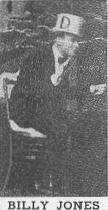Original Dixieland "Jones" Band
|
| |
(Story by Sinclair Traill - Jazz Journal. London. England)
|
|
|
I am quite sure that none of the members of the Original Dixieland Jazz Band would mind my alteration of `jazz' to Jones' for the title of this article. for Jones is Jazz and therefore it is only a substitution rather than an alteration.
|
|
band of their kind to appear in New York. But there was one man playing round the clubs in the city who might be induced to help them out; his name was J. Russell Robinson.
|
| |
Robinson was an accomplished musician and it would be thought that, as far as pianists went anyway, the band's troubles were over. They were, but only for a short time!
|
| |
|
|
Billy Jones was the boy who helped the band out when they were left high and dry by t h e loss of their pianist and he was greatly instrumental in helping them gain the tremendous popularity y which w a s theirs in this country during their stay in 1919-1920.
|
|
 |
|
|
| |
|
The impression in England is that J. Russell Robinson, for some reason or other, couldn't settle down in England and also, truth to tell, didn't get along too well with his brother members of the Original Dixieland Jazz Band. One of the chief bones of contention was that Russell Robinson tried to "school" the band and his efforts weren't too appreciated. He was a tutored musician who could read the `dots', whilst the rest of the band were
|
In the spring of 1919 the band had been booked by Albert de Courville to appear in his new revue "Joy Bells'' which was to be staged at the London Hippodrome, but just before they left America for England, a major tragedy befell them. Their pianist, Henry Ragas, suddenly collapsed in the wings of the theatre at which they were playing. He died soon afterwards. This was not too long before their
|
|
| |
plain and simple buskers: they could not read a note and didn't want to learn. Their way of playing had been good enough to bring them from obscurity in New Orleans to fame in London and New York, so why alter now? Dissension spread and Russell Robinson quit and caught a boat back to New York.
|
| |
More piano trouble! But not for long. The Original Dixieland Jazz Band had had a short life in the "Joy Bells" revue. The star of the show was the comedian George Robey. He was a good comedian, but he couldn't stand jazz. The first night the band was on stage, he listened to a few bars from the wings, made a rude noise with his lips and departed to ask Dc Corville to withdraw the act. Robey's word was more or less law. The band left.
|
sailing date, and the band was stricken with grief at the tragic death of their friend. Also, they were consumed with anxiety as to where to find a replacement at such short notice.
|
|
You must remember that these were early days and jazz-pianists in New York were about as rare as hen's teeth. They had been booked into Max Hart's Reisenweber Cafe by Al (Sonny Boy) Jolson and they were the first
|
|
| |
|
(Continued on Page 25)
|
|
THE SECOND LINE, SEPTEMBER-OCTOBER, 1955 23
|